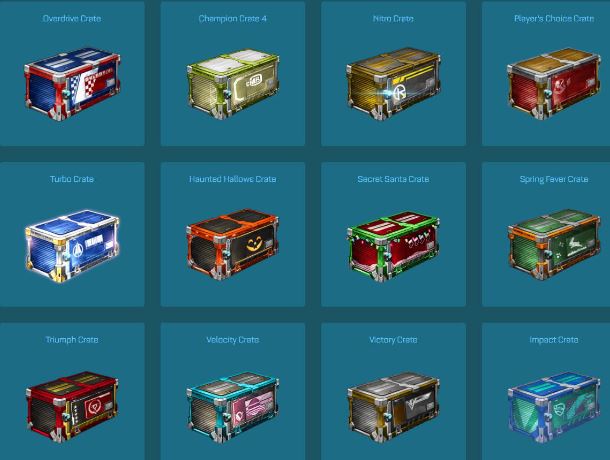In the ever-evolving world of video games, the industry has faced its fair share of controversies and criticisms, particularly regarding loot boxes and their potential to promote gambling-like behaviors. Rocket League, the immensely popular vehicular soccer game developed by Psyonix, found itself at the center of this debate. However, in a bold and commendable move, the game's developers decided to remove the controversial crate system, ushering in a new era of more transparent and ethical loot mechanics.

The Rise and Fall of Crates
Crates, or loot boxes, have been a contentious aspect of many modern games, offering players the chance to acquire rare and desirable items through a randomized system. In Rocket League, these crates contained a variety of cosmetic items, such as vehicle decals, wheels, and boost trails. Players could either purchase keys to unlock the crates or trade with other players for the desired items.
While the crate system provided an exciting element of surprise and rarity, it also drew criticism from players and industry watchdogs alike. The random nature of the loot and the potential to spend money on keys without any guarantee of receiving the desired items raised concerns about gambling-like mechanics being present in a game enjoyed by players of all ages.
The Controversy Surrounding Loot Boxes
The debate surrounding loot boxes and their potential to promote addictive behaviors, particularly among younger audiences, gained significant traction in recent years. Governments and regulatory bodies around the world began to scrutinize the practice, with some countries classifying loot boxes as a form of gambling and implementing strict regulations.
Psyonix, the developers of Rocket League, recognized the growing concerns and the need for a more ethical and transparent approach to in-game item acquisition. In December 2019, they made the bold decision to remove the crate system entirely from Rocket League, paving the way for a new and more consumer-friendly loot system.
The Blueprint Update: A New Era of Transparency
With the removal of crates, Psyonix introduced the Blueprint update, a revolutionary system that aimed to provide players with complete transparency regarding the items they could acquire and their associated costs. This update marked a significant shift in the industry, setting a precedent for a more ethical and responsible approach to in-game monetization.
How the Blueprint System Works
The Blueprint system allows players to see what items are available for purchase before committing to a purchase. Each Blueprint showcases the specific item, its rarity, and the exact number of Credits (Rocket League's in-game currency) required to unlock it. This level of transparency eliminates the element of chance and uncertainty that was inherent in the crate system.
Furthermore, Blueprints can be revealed through gameplay or purchased directly from the in-game shop, providing players with multiple avenues to acquire the items they desire without the need for a middleman or third-party trading.
The Benefits of the Blueprint System
The Blueprint system offers numerous benefits to players and the gaming community as a whole:
- Transparency: Players have full visibility into the items they are purchasing, eliminating any element of surprise or chance.
- Ethical Monetization: By removing the gambling-like mechanics of loot boxes, Rocket League has taken a stance against predatory practices and prioritized ethical monetization.
- Player Choice: With Blueprints, players can make informed decisions about which items they want to acquire, fostering a sense of control and agency.
- Community Engagement: The transparency of the Blueprint system has fostered a more engaged and supportive community, as players can openly discuss and share their desired items without the risk of exploitative practices.
The Industry's Shift Towards More Ethical Loot Systems
Rocket League's decision to remove crates and implement the Blueprint system has not gone unnoticed within the gaming industry. Other game developers and publishers have taken note of the positive reception and the potential benefits of a more transparent and ethical approach to in-game item acquisition.
Major titles like Overwatch and Apex Legends have implemented similar systems, allowing players to view the contents of loot boxes before making a purchase. This trend towards transparency and ethical monetization is a positive step forward for the industry, fostering trust and goodwill among players while addressing concerns raised by regulatory bodies and consumer advocacy groups.
The Future of Loot Systems
As the gaming industry continues to evolve, it is likely that more developers and publishers will follow suit and adopt transparent and ethical loot systems. The success of the Blueprint update in Rocket League has demonstrated that players are willing to embrace and support a more consumer-friendly approach, provided that it offers transparency, choice, and a fair value proposition.
Furthermore, the industry's shift towards ethical loot systems may also pave the way for increased regulatory clarity and guidelines, ensuring that games remain fun and engaging experiences without compromising consumer protection or promoting potentially harmful behaviors.
Rocket League's decision to remove crates and introduce the Blueprint system was a bold and commendable move that set a new standard for ethical and transparent loot mechanics in the gaming industry. By prioritizing player choice, transparency, and responsible monetization, Psyonix has not only addressed concerns surrounding gambling-like mechanics but also fostered a more engaged and supportive community.
As the industry continues to evolve, it is crucial for game developers and publishers to prioritize ethical practices and consumer protection. The success of the Blueprint update serves as a reminder that players are willing to embrace and support systems that offer transparency, choice, and a fair value proposition.
Rocket League's journey from crates to Blueprints is a testament to the power of listening to player feedback and prioritizing ethical and responsible game design. As the industry continues to grow and evolve, it is essential that developers and publishers remain committed to fostering a gaming environment that is not only entertaining but also fair, transparent, and inclusive for all players.